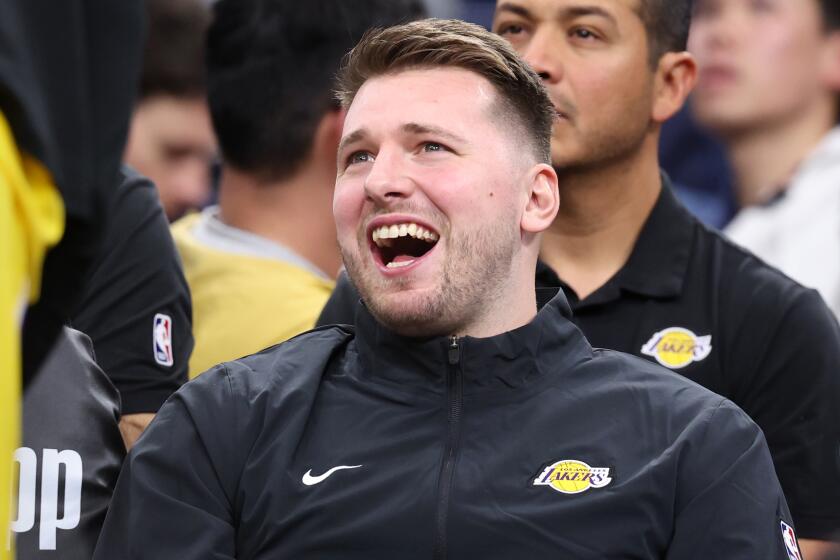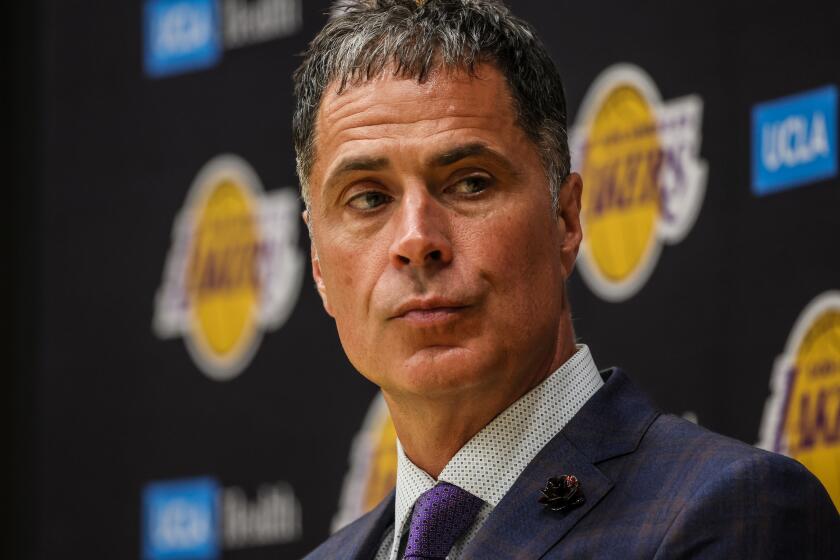Seoul ’88 / Randy Harvey : Soviet Sabonis May Be in Same Boat as Sam Bowie
- Share via
The two most celebrated 7-foot centers whom the Portland Trail Blazers have drafted since Bill Walton may be rehabilitating from injuries together this summer.
One is Sam Bowie, formerly of the University of Kentucky, who may never return to competition after suffering a broken leg last fall for the fourth time in six years.
The other is Arvidas Sabonis of the Soviet Union. The prognosis for his recovery from a ruptured Achilles’ tendon is better, although he has less chance of wearing a Trail Blazer uniform in the near future than Bowie.
Once considered by National Basketball Assn. scouts as a prospect to become the world’s most dominating center, Sabonis, 23, has not been a factor in international play since 1984. There was speculation that he became bored with the lack of competition in European basketball, began acting like a prima donna and quit improving.
But injures were another factor, particularly one to his Achilles’ tendon that he aggravated at the 1986 World Championships, which the United States won with a victory in the final against the Soviet Union, and ruptured a year later in a fall down a flight of stairs.
After surgery last summer in his native Lithuania, Sabonis came to the United States 12 days ago to consult with three orthopedic specialists, Steve Lombardo of the Lakers, Robert Cook of the Trail Blazers and Jack Hughston of the Hughston Sports Clinic in Columbus, Ga., to determine whether further surgery was required.
Kim Bohuny of the Turner Broadcasting System, which helped arrange the visit, said the doctors agreed that the operation in Lithuania was a success and that all Sabonis needs is three to four months of intensive rehabilitation.
She said that the Trail Blazers, who drafted Sabonis in the first round two years ago on the longshot chance that the Soviet Sports Committee might allow him to play in the NBA after the 1988 Summer Olympics, want him to remain in Portland for the rehabilitation. She said that Sabonis’ personal doctor, Kestitus Vitkus, also recommended that to the Soviets.
“Dr. Vitkus believes Sabonis should stay in Portland and rehabilitate with Bowie so that he will see how much work it is,” Bohuny said.
She said the concern is that the Soviets will bring Sabonis home before he recovers--his visa expires Friday--and try to rush him into competition in time for the Summer Olympics, Sept. 17-Oct. 2.
“The doctors feel that might be too soon and that he may be taking a chance if he does that,” Bohuny said. “Sabonis is very nationalistic and wants to play. If they let him, he’ll play.”
As for rumors that the Soviets fear Sabonis might defect, Bohuny said: “He would love the opportunity to play in the NBA. He believes that’s the greatest thing a basketball player can dream for. But he loves Lithuania and would never leave.”
The Trail Blazers measured Sabonis this week at 7-3.
Anchorage Organizing Committee (AOC) officials, who are campaigning for the 1994 Winter Games, believed all they had to do was persuade the rest of the world that the Olympics should come to the city. They recently discovered that they still have some persuading to do in Anchorage, Alaska.
After a report in the Anchorage Daily News that the city would have to sign a contract with the International Olympic Committee guaranteeing to cover any losses that might result from the Games, the city’s assembly members were perplexed that they had not been informed of the stipulation.
Realizing that it was only a matter of time before the assembly demanded a referendum, AOC officials suggested it themselves. The referendum is expected to be part of the Aug. 23 state primary ballot.
A pollster for the Anchorage Times said persons contacted favor having the Olympics in Anchorage by a 2-1 margin, but that dwindles to 50-50 when asked if the city should act as guarantor. A small but vocal opposition group, Alaskans Concerned About Anchorage Winter Olympics, reports that its membership has grown considerably since the revelation.
But AOC officials are optimistic. The president, Rick Mystrom, told the United States Olympic Committee House of Delegates last weekend in Washington that Anchorage will withdraw the bid if the vote is negative. But he added that he expects approval by a 3-1 margin once the people are convinced that there will be no losses. He said the AOC can raise enough money through sponsorships and television rights fees to finish in the black.
Mystrom said the referendum could even work in the AOC’s favor, sending it to IOC meetings in Seoul, South Korea, for the Sept. 15 vote with a clear mandate that the Games are wanted in Anchorage.
But one problem for AOC officials is that they must spend the summer campaigning in Anchorage, while their competitors--Sofia, Bulgaria; Ostersund, Sweden; Lillehammer, Norway, and Lausanne, Switzerland--are trying to win IOC support.
COMMENT: Rep. Frank Annunzio (D-Ill.) lamented the fact at a banquet to honor selected U.S. Olympic athletes Friday in Washington that the government will spend $13.5 billion this year in foreign aid while it is “unwilling to spend even 1 cent directly to help our United States Olympic team.”
One can only hope that Annunzio’s remarks were an example of a politician saying anything to elicit an ovation and not a sincere expression of his priorities.
The notion of the government cutting foreign aid in order to support U.S. elite athletes is not attractive. If the government wants to spend money on sports in this country, it would be better served by concentrating on children at the grass-roots level, particularly those in underprivileged areas who may not be exposed to many Olympic sports.
Also, the USOC should be thankful it receives no federal financing. The money the USOC would receive is not enough to pay for the independence it would forfeit. The USOC has proven it can create enough messes on its own without government assistance.
Officials from some countries complained during the 1984 Summer Olympics that they had to pay too much to house their athletes in the Olympic villages. They got sympathy and little else from the IOC, which had been convinced by the Los Angeles Olympic Organizing Committee that the prices were necessary to help avoid a deficit.
But when the LAOOC revealed its substantial surplus, the IOC asked that the countries be reimbursed for their village fees.
The USOC, which by then had received its share of the surplus, decided instead to award grants based on need to countries that had attended the Games, establishing a $4.2-million Friendship Fund.
By the end of this year, the program will have financed 215 projects at a cost of about $3.6 million. Although some U.S. athletes complained that the money helped athletes from other countries gain an advantage, the Friendship Fund generally was considered an overwhelming success and created considerable good-will. For example, Puerto Rico was able to send a team to the men’s handball tournament at the Pan American Games last summer because of a USOC grant.
The program probably will not be renewed after 1988, but USOC President Robert Helmick said he will recommend that other countries will still receive financial assistance.
“This fund was instituted because of a particular pool of money,” he said. “There’s no need to institutionalize this particular fund. But we have always had in our budget some ability to help out internationally. I would hope for that to continue.”
The foreign aid, Helmick noted, is not entirely for philanthropic purposes. He said it also aids the United States in soliciting support for its point of view when issues arise in international sports.
Olympic Notes
USOC executive board member Donna DeVarona, a former Olympic swimming champion, made a tearful resignation speech before the House of Delegates last weekend, citing family and career demands. She became a mother shortly before the Winter Olympics in Calgary, Canada, where she worked as a commentator for ABC. But USOC sources said ABC asked DeVarona to resign from the executive board, believing her position created a conflict of interest with her role at the network. USOC officials said she is virtually irreplaceable because of her long-time commitment to the Olympic movement . . . DeVarona also resigned from the Steinbrenner Commission, an 8-member group assigned in February to study whether the USOC is moving in the right direction. The chairman, George Steinbrenner, gave a brief update to the House of Delegates, saying that the group is “not on a witch hunt,” but said a full report probably would not be ready until the spring of 1989.
World champion boxer Kelcie Banks, who has his own business cards proclaiming himself “Mr. Mix,” brought autographed pictures of himself to distribute when he and other athletes were honored by the USOC at the Executive Office Building in Washington last week. The only taker was 14-year-old archer Denise Parker. “I don’t think I could ever hand out pictures of myself,” she said. . . . Of the estimated $50 million it will receive from the sale of U.S. Olympic coins this year, the USOC has allotted $1.4 million for the upgrade of the bobsled and luge runs at Lake Placid, N.Y., the only such runs in the United States. Or should that read downgrade? The runs are considered so demanding that only the elite athletes can use them. The USOC also decided to divide $500,000 among athletes who are relinquishing their jobs so they can train for the Summer Olympics.
Bill Wall, executive director of the American Basketball Assn. of the United States, said there is no guarantee that center David Robinson, formerly of the Naval Academy, will make the U.S. team in Seoul. Wall said that Robinson, who is fulfilling a 2-year commitment to the Navy before joining the San Antonio Spurs, was not in basketball shape for the Pan American Games last summer and has played less this year than in 1987. Wall said that Robinson probably will be among the 18 to 20 players advancing beyond the trials, May 19-24 in Colorado Springs, but may not be one of the 12 in the Olympics . . . When Cuba’s Manuel Gonzalez Guerra joined six other visiting IOC members as well as USOC officials at a State Department dinner Friday night in Washington, he became the first Cuban official to visit the State Department during the Reagan Administration.
Tentatively approved as a site for an Olympic training center, San Diego has 90 days to submit details of its proposal and 180 days to reach an agreement to agree with the USOC. Two other cities, Indianapolis and Tampa, Fla., also plan to seek approval to build training centers. Some USOC officials are concerned that not enough athletes are using the three training centers already in existence in Colorado Springs, Colo., Lake Placid and Marquette, Mich. . . . The USOC voted to support the bobsled federation’s attempts to have single-person, head-first sledding, readmitted as an Olympic sport for the 1992 Winter Games. It was part of the program in 1924 and 1948. But ballroom dancing was rejected in its effort to become USOC-sanctioned. “That’s only fair,” NBC’s Bob Costas said. “They wouldn’t allow making out in the theater balcony in either.”
More to Read
All things Lakers, all the time.
Get all the Lakers news you need in Dan Woike's weekly newsletter.
You may occasionally receive promotional content from the Los Angeles Times.










